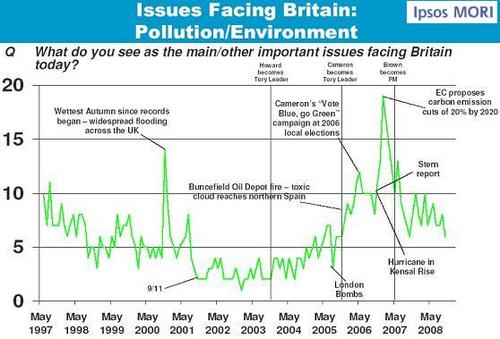Mike at Political Betting posted a fascinating graph and analysis yesterday, showing the variation in the public's reported interest in the environment. I'm sure he won't mind me reproducing it, especially if I urge you to make any urgent bets on Glenrothes or the US election through his site.
The points he's indicated are interesting, but three more occur to me: May 1999, May 2003, and May 2007.
In the first Holyrood election, around 5% said the environment was their main concern, and we got our first MSP. In one sense, this was our best election ever, because it was the first we elected anyone at, and failure then would have made any success in 2003 almost impossible. However, it was also our lowest level of representation, if you want to look at it that way.
By 2003, according to Mike's graph, the numbers prioritising environmental concerns had halved, but despite that we scored our best Parliamentary results so far, up to seven MSPs. Then, in May 2007, with the numbers up at 10%, just after a peak of around 18%, we fell back to two seats.
So this polling number, whatever it means, isn't correlated to Green success, at least in Scotland, which might seem counter-intuitive.
Perhaps the reason is that we're not a party purely about environmental issues. We have solid policy on the whole range of political issues, and there are plenty we've made particular strengths of, including opposition to the war, support for equality and civil liberties, fuel poverty, social justice, local food, social enterprise and many more. It looks as though the part of the electorate we appeal to understands that.






Interesting - I've always been fascinated by the way the Holyrood electoral system can impact on voting patterns and outcomes.
I still fundamentally think that we don't have single issue voting in this country which in some cases is what the Greens are still seen as.
Linked in with this there's the fact that we do still have tribal voting so people who associate with one of the 'big' parties. When elections are tight the votes of smaller parties are likely to be squeezed and I think that's been the 1999, 2003 and 2007 experiences.
There's more on this from me at the link below if you're interested:
http://ideasofcivilisation.blogspot.com/2008/08/stands-scotlands-small-parties-where.html
Thanks, IoC, I agree that the squeeze was a far more significant factor. And, sadly, some people do still see us as single issue. Both are hard to counter, but we'll do our best.